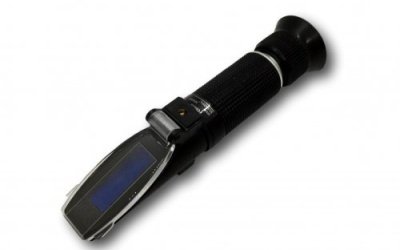How to Measure the Specific Gravity of Urine with an Optical Refractometer

Several types of refractometers are suitable for measuring specific gravity. For this demonstration, we have chosen the IC300005 clinical refractometer to showcase the technique required using an optical refractometer to measure urine's specific gravity (and refractive index). Readings only take seconds.
Figure 1 Watch an Instrument Choice scientist demonstrate how to use an optical refractometer for urine specific gravity here.
How to Use the IC300005 Optical Refractometer For Urine (Specific Gravity)
Materials
You will need;
- IC300005 Clinical Refractometer
- Distilled Water
- Screwdriver
- Urine sample
- Transfer pipette
- Cleaning cloth
- Appropriate PPE
Zero Calibration
- Open the cover plate and wipe down the prism with a soft cloth to remove any dust.
- Add a few drops of distilled water to the prism platform.
- Close the cover plate, ensuring the water spreads evenly across the prism.
- Aim the refractometer toward a light source and rotate the eyepiece to obtain a clear focus on the boundary line.
- The blue-white boundary line should coincide with the bottom line of the scale; 1.3330 and 1.000 respectively. If the boundary line is not at the bottom of the scale, use the screwdriver to turn the calibration screw until the line is at the bottom of the scale.
- After calibration is complete, clean the prism using a soft cloth or tissue and ensure it is dry before taking a sample measurement.
|
IC TIP: The zero-point calibration temperature should be at the same temperature as your intended test solution. |

Figure 1 Blue-white boundary line
Sample Analysis
- Open the cover plate.
- Use the transfer pipette to place a few drops of the test solution on the prism.
- Close the cover plate, ensuring that the sample spreads evenly on the prism.
- Aim the prism of the refractometer towards a light source and focus the eyepiece on the boundary line.
- The boundary line indicates the concentration of urine specific gravity and refractive index of the test sample. See figure 2 for available scales, the refractive index is on the left-hand side, and the specific gravity scale is on the right side.

Figure 2 The Refractive index and uring specific gravity scales on the IC300005 clinical refractometer.
Conclusion
Performing a zero calibration and measuring urine specific gravity on the IC300005 clinical refractometer is a straightforward task.
For more information on how you can use a refractometer for urine view the links below or contact a scientist!
Additional links
- View the IC300005 Clinical Refractometer here.
- Watch "How to Use an Optical Refractometer For Urine (Specific Gravity)" again.
- Want to see what comes in the box? Watch an Instrument Choice scientist “Unboxing The Clinical Refractometer – IC300005”
- Browse all refractometers for urine here
Also interesting
Kestrel is known for very accurate, straightforward environmental monitoring solutions. Your Instrument Choice Scientists have formulated four easy-to-follow tips to ensure the highest level of precision from Kestrel's handheld products.

Your destination for scientific equipment just got a revamp. At instrumentchoice.com.au, you will find the same easy to navigate site and same extensive product range - with enhanced features for an even better shopping experience.
Expert customer service. Advice from real scientists. Easy Shopping. Express Shipping. Risk-Free Purchasing.

